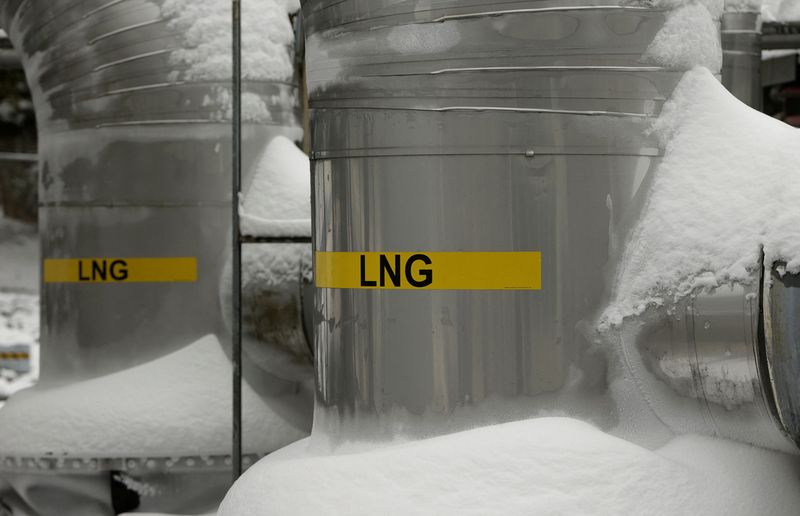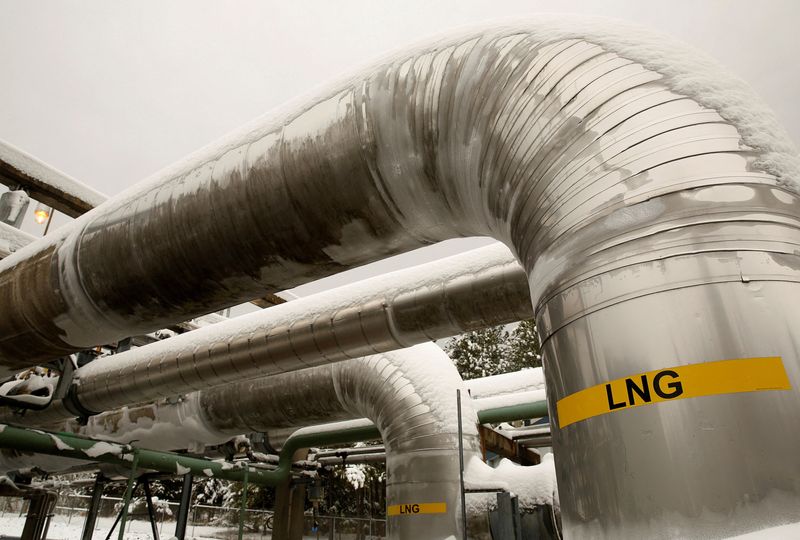By Scott DiSavino
(Reuters) - The United States, the world's top natural gas producer, wants to send more liquefied natural gas (LNG) to Europe to help its allies break their dependence on Russian gas after Moscow invaded Ukraine on Feb. 24.
On Thursday, U.S. President Joe Biden promised the United States would deliver at least 15 billion cubic meters (bcm) more LNG to Europe this year than planned before, sources familiar with the matter said.
That amount - 15 billion cubic meters (bcm) - converts to about 1.5 billion cubic feet per day (bcfd). For context, 1 billion cubic feet is enough to heat 5 million U.S. homes for a day.
HOW MUCH LNG DOES THE UNITED STATES EXPORT?
The United States, which produces 96.7 bcfd of gas, has the capacity to supercool about 12.7 bcfd into liquid for transportation by tanker.
All seven U.S. LNG export plants, however, are currently operating at capacity and liquefying about 12.7 bcfd of gas. So, no matter how high global prices rise, the U.S. cannot produce anymore LNG - at the moment.
About 24%, or around 2.4 bcfd, of U.S. LNG exports went to Europe in 2021, according to data from Rystad Energy.
The United States has already supplied an extra 0.8 bcfd from January to February, compared to the same period a year ago.
"The U.S. can easily exceed this 15 bcm (1.5 bcfd) target, as European price signals ... are likely to far exceed Asian spot prices," Sindre Knutsson, vice president at Rystad Energy, said in a note.
U.S. processing capacity was on track to rise to around 13.1 bcfd by the end of 2022 as more liquefaction trains at Venture Global LNG's Calcasieu Pass export plant in Louisiana enter service.
WHAT DOES EUROPE IMPORT FROM RUSSIA?
Russia produced about 67.9 bcfd of gas in 2021 and exported 24.4 bcfd, of which almost 75% (18.3 bcfd) went to Organization for Economic Co-Operation and Development (OECD) countries in Europe. The OECD is a club of mostly rich countries.
SO, CAN THE UNITED STATES GET MORE GAS TO EUROPE?
Yes, but it would not equal what Russia sends to Europe, and it will largely involve rerouting existing shipments.
"We expect near-term measures to support European LNG imports to rely on the reallocation of existing supply," analysts at Goldman Sachs (NYSE:GS) said.
A senior U.S. administration official said the effort will involve arrangements with allies around the world, both producers and consumers, to route shipments to Europe.
Goldman Sachs said "such a relocation to Europe is already happening" because European gas prices have been among the highest in the world for the past few months.

Analysts said governments can find ways to encourage tankers to keep going to Europe. In the short-term, governments could provide subsidies to enable European utilities to pay more for LNG cargoes or the governments could provide the extra money directly to shippers to encourage them to deliver more cargoes to Europe.
However, Europe's LNG terminals have limited available capacity to absorb extra supply from the United States or other major producers in the event gas from Russia is disrupted.
